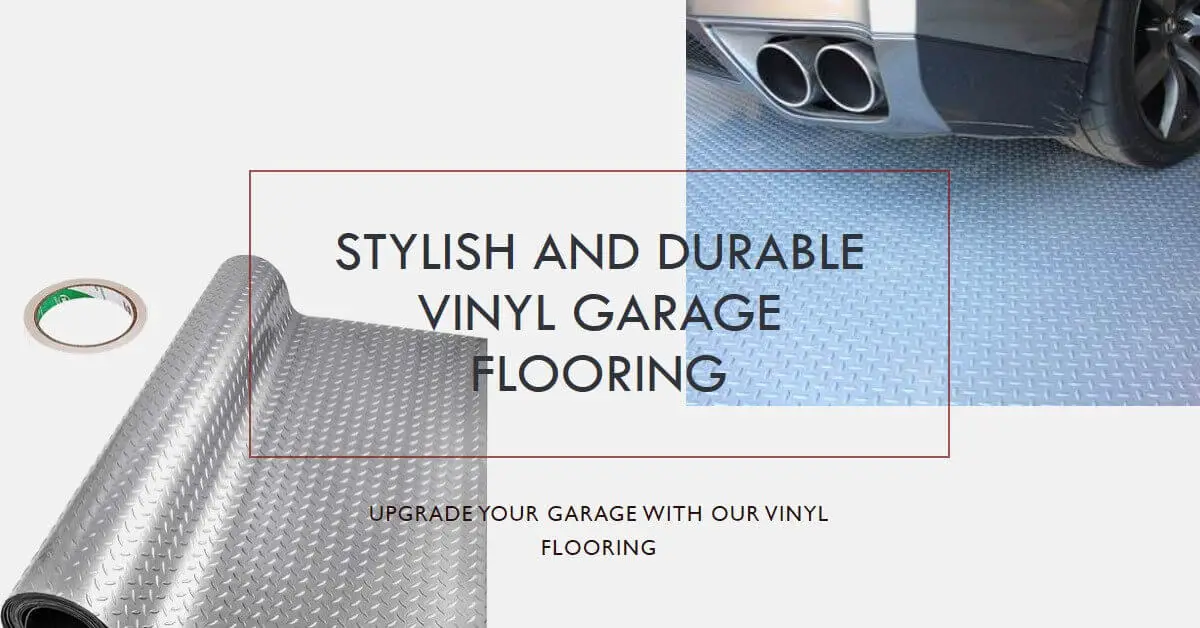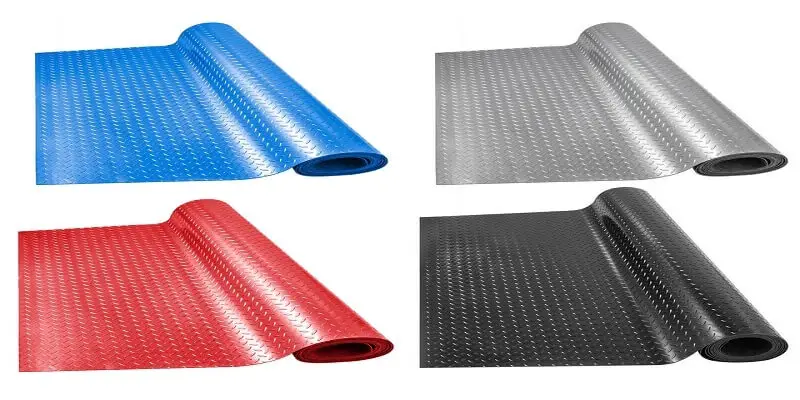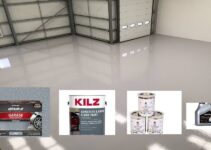Vinyl Garage Flooring
Vinyl garage flooring is a fantastic option for homeowners seeking a durable, stylish, and practical flooring solution for their garages.
Having already installed it in my own garage, I can attest to its numerous advantages and straightforward installation process.
In this article, we will delve into the benefits of vinyl garage flooring, the installation steps I took, maintenance tips based on my experience, comparisons with other flooring options, and the associated costs.
Let’s dive in and explore why vinyl garage flooring is the ideal choice for your garage.
What is Vinyl Garage Flooring?
Vinyl garage flooring refers to the use of vinyl materials specifically designed for garage floors. It is a type of resilient flooring that offers durability and resistance to wear and tear.
Vinyl garage flooring comes in the form of sheets or tiles and is available in a wide range of designs, colors, and patterns, allowing you to customize your garage floor to match your personal style and preferences.
Advantages of Vinyl Garage Flooring

Durability and Longevity
One of the key advantages of vinyl garage flooring is its exceptional durability and longevity.
Vinyl flooring is engineered to withstand heavy foot traffic, impacts from dropped tools or equipment, and the weight of vehicles.
It is designed to resist dents, scratches, and stains, making it an ideal choice for a high-traffic area like the garage.
Having already installed vinyl flooring in my garage, I can attest to its durability even after years of use.
Easy Maintenance
Vinyl garage flooring requires minimal maintenance, making it a convenient choice for busy homeowners.
Regular sweeping and occasional mopping with mild soap and water is usually sufficient to keep the floor clean and well-maintained.
The moisture-resistant properties of vinyl make it resistant to mold and mildew growth, ensuring a healthy environment in your garage.
I have found that maintaining vinyl flooring is effortless and doesn’t require any specialized cleaning products or techniques.
Resistance to Stains and Chemicals
Vinyl garage flooring is highly resistant to stains and chemicals commonly found in a garage setting.
Oil spills, gasoline, and other automotive fluids can be easily wiped off without leaving permanent stains.
This feature not only keeps your garage looking clean and tidy but also protects the longevity of the flooring.
I’ve experienced spills and leaks in my garage, and the vinyl flooring has proven to be highly resistant to these substances, making cleanup a breeze.
Enhanced Safety
Vinyl garage flooring is designed to enhance safety within the garage. It often has a textured surface that provides grip and reduces the risk of slips and falls, even when the floor is wet.
This is particularly important in a garage environment where spills and wet conditions are common.
Some vinyl flooring options offer cushioning properties, providing a more comfortable surface to stand on for extended periods.
I’ve noticed the added safety and comfort provided by the textured surface of my vinyl garage flooring.
Variety of Designs and Styles
Vinyl garage flooring offers a wide range of designs and styles to suit any aesthetic preference.
From sleek and modern to classic and rustic, there is a vinyl flooring option to complement the overall look of your garage.
Whether you prefer a checkered pattern, a wood-like appearance, or a solid color, vinyl flooring allows you to personalize your garage space.
I thoroughly enjoyed choosing a design that matched my garage’s theme and gave it a unique touch.
Installation Process of Vinyl Garage Flooring
Having already installed vinyl garage flooring in my own garage, I can provide insights into the installation process. Here are the general steps involved:
Preparing the Surface
To ensure a successful installation, it’s crucial to prepare the garage floor properly.
Start by clearing the area and removing any existing flooring or debris.
Clean the surface thoroughly, removing dust, dirt, and grease. Repair any cracks or uneven spots in the floor using appropriate fillers or patching materials.
Choosing the Right Vinyl Flooring
Selecting the right type of vinyl flooring for your garage is essential. Consider factors such as thickness, durability, and design options.
It’s recommended to choose vinyl flooring specifically designed for the garage environment, as it will offer better resistance to heavy loads, impacts, and moisture.
Installing the Underlayment (Optional)
Depending on the specific vinyl flooring you choose, installing an underlayment may be necessary.
The underlayment provides additional cushioning, insulation, and sound absorption.
Follow the manufacturer’s instructions for installing the underlayment, ensuring it is properly secured and aligned.
Installing the Vinyl Flooring
Follow the manufacturer’s instructions for installing the vinyl flooring.
This typically involves laying out the vinyl sheets or tiles in the desired pattern, starting from one corner of the garage.
Ensure proper alignment and a tight fit between the pieces.
Depending on the type of vinyl flooring, you may use adhesive, double-sided tape, or a click-lock system to secure the flooring to the prepared surface.
Use a roller to press the vinyl into place, ensuring good adhesion.
Finishing Touches
Once the vinyl flooring is installed, trim any excess material along the edges using a utility knife.
Install baseboards or trim to cover the gaps and provide a finished look.
Clean the floor thoroughly to remove any adhesive residue or debris, using the appropriate cleaning products recommended.
Read Also:
Is Vinyl Flooring Good for Garage?
10 Best Vinyl Garage Flooring Ideas
Congratulations on completing your garage makeover! Here are the top 10 vinyl garage flooring ideas that you implemented in your garage:

1. Classic Checkerboard Pattern
You chose the timeless and elegant classic checkerboard pattern for your vinyl garage flooring. By using alternating black and white vinyl tiles, you achieved a retro-inspired look that adds sophistication and nostalgia to your garage.
2. Wood-Look Vinyl Planks
To bring warmth and natural charm to your garage, you installed wood-look vinyl planks. With a variety of wood species and finishes available, you selected a design that replicates the beauty of hardwood floors while benefiting from the durability and easy maintenance of vinyl.
3. Metallic Finish
For a sleek and modern aesthetic, you opted for vinyl garage flooring with a metallic finish. This choice adds sophistication and contemporary touch to your garage. You selected a metallic color, such as silver, copper, or bronze, to match your garage’s overall design.
4. Coin Pattern Texture
To ensure safety and add visual interest, you went with vinyl garage flooring featuring a coin pattern texture. The small raised circles provide traction and prevent slipping, while the texture enhances the durability and ease of cleaning.
5. Diamond Plate Pattern
To achieve an industrial and rugged appearance, you chose vinyl garage flooring with a diamond plate pattern. This design mimics the look of diamond plate steel, adding a bold and eye-catching statement to your garage floor.
6. Solid Color Options
For a simple and clean look, you decided on solid-color vinyl garage flooring. Whether you opted for a vibrant color to make a statement or a neutral tone for a more understated vibe, the solid color options provide a versatile backdrop for showcasing other elements and accessories in your garage.
7. Racing Stripes
You added a sporty touch to your garage with vinyl flooring featuring racing stripes. By choosing contrasting colors, you created a dynamic and energetic atmosphere that appeals to car enthusiasts or anyone seeking a sense of speed and excitement.
8. Custom Logo or Graphics
To make your garage truly unique, you incorporated custom logos or graphics into your vinyl garage flooring. Whether it’s your favorite sports team’s emblem, your company logo, or a personalized design, the custom graphics add a personal touch and make a bold statement that reflects your personality.
9. Stone-Look Tiles
To bring an element of luxury and sophistication, you selected stone-look vinyl tiles for your garage. With options ranging from sleek marble to rustic slate, you captured the elegance of natural stone while benefiting from the durability and easy maintenance of vinyl.
10. Geometric Patterns
To achieve a contemporary and artistic look, you opted for vinyl garage flooring with geometric patterns. Whether you chose intricate mosaics or bold abstract designs, the geometric patterns add visual interest and serve as a focal point in your garage, reflecting your personal style.
Tips for Maintaining Vinyl Garage Flooring
To maintain the longevity and appearance of your vinyl garage flooring, consider the following tips:
Regular Cleaning
Regularly sweep or vacuum the floor to remove loose dirt and debris. Clean the floor with a damp mop and a mild cleaner designed for vinyl flooring. Avoid using harsh chemicals or abrasive cleaners that can damage the surface.
Preventing Scratches and Damage
Place protective pads or furniture coasters under heavy items to prevent scratches. Use floor mats or rugs in high-traffic areas or where there is a likelihood of spills. Avoid dragging heavy objects or sharp tools directly on the vinyl surface.
Handling Spills Promptly
Wipe up any spills or liquids immediately to prevent staining or damage to the vinyl. Avoid letting fluids sit on the floor for an extended period.
Avoiding Excessive Moisture
While vinyl flooring is moisture-resistant, it’s still important to avoid excessive moisture or standing water on the floor. Promptly clean up any water or liquid spills and ensure proper ventilation in the garage to prevent moisture buildup.
Regular Inspections
Periodically inspect the floor for any signs of damage, such as scratches, gouges, or loose tiles. Address any issues promptly to prevent further damage and ensure the longevity of your vinyl garage flooring.
Read Also:
Inexpensive Garage Flooring Ideas
Comparing Vinyl Garage Flooring to Other Options
Having already explored different flooring options in my own garage, I can provide a comparison between vinyl garage flooring and other popular choices:
Epoxy Flooring
Epoxy flooring is known for its durability and attractive finish. However, compared to vinyl garage flooring, epoxy coatings usually require professional installation, which can be more expensive.
Over time, epoxy coatings may be prone to chipping or peeling, requiring maintenance or reapplication.
In contrast, vinyl flooring is easier to install, more cost-effective, and offers similar durability without the need for extensive professional expertise.
Interlocking Tiles
Interlocking tiles are a popular DIY-friendly option for garage flooring. They offer ease of installation and can be easily replaced if damaged.
However, interlocking tiles may not be as durable or resistant to stains and chemicals as vinyl flooring. Vinyl garage flooring, on the other hand, provides excellent durability, resistance to stains and chemicals, and a more uniform and seamless appearance.
Additionally, vinyl flooring requires less maintenance and is more resistant to wear and tear.
Concrete Stain
A concrete stain is an economical option that can provide a unique and decorative look to garage floors. It offers a variety of colors and finishes to choose from.
However, concrete stains may require regular reapplication to maintain their appearance and protect the underlying concrete. It may also be more susceptible to staining and damage from spills and chemicals compared to vinyl garage flooring.
Vinyl flooring, with its superior stain resistance and durability, requires less maintenance and provides a more consistent and long-lasting finish.
Cost of Vinyl Garage Flooring
After having already installed vinyl garage flooring in my own garage, I can provide insights into the cost considerations. The overall cost of vinyl garage flooring can vary based on several factors:
Quality of Vinyl
The cost of vinyl flooring can vary depending on its quality and durability.
Higher-quality vinyl flooring is generally more expensive but offers better durability and longevity.
It’s important to choose a vinyl product that is specifically designed for garage use to ensure it can withstand the demands of the environment.
Size of the Garage
The size of your garage will directly impact the cost of materials. The larger the area, the more vinyl flooring will be required.
It’s advisable to accurately measure the square footage of your garage to determine the amount of vinyl flooring needed and calculate the cost accordingly.
The Complexity of the Installation
The complexity of the installation process can also affect the cost. If your garage floor requires extensive preparation, such as repairing cracks or uneven spots, it may incur additional expenses.
Additionally, if you choose to hire a professional for the installation, labor costs will need to be factored into the overall budget.
Overall, when compared to other garage floors options like epoxy or interlocking tiles, vinyl garage flooring is considered a cost-effective choice.
While the initial cost of high-quality vinyl flooring may be slightly higher than some alternatives, its durability, low maintenance requirements, and long lifespan contribute to its overall value and cost-effectiveness.
| Factors | Cost Range |
|---|---|
| Quality of Vinyl | $2 – $5 per square foot |
| Size of the Garage | Varies based on square footage |
| Complexity of Installation | Additional expenses may apply for repairs or professional installation |
|---|---|
| Overall Cost | Varies based on the above factors |
| Type of Vinyl Garage Flooring | Price Range (per square foot) |
|---|---|
| Peel-and-Stick Vinyl Tiles | $1 – $5 |
| Interlocking Vinyl Tiles | $3 – $8 |
| Roll-Out Vinyl Flooring | $2 – $6 |
| Luxury Vinyl Planks | $4 – $10 |
Conclusion
Having already installed vinyl garage flooring in my own garage, I can confidently conclude that it is a top-notch choice for homeowners seeking a durable, stylish, and practical flooring solution.
With its numerous advantages and ease of installation, vinyl flooring has proven to be an excellent option for garage floors.
The benefits of vinyl garage flooring are evident. Its exceptional durability and longevity ensure it can withstand heavy foot traffic, impact from dropped tools or equipment, and the weight of vehicles.
The resistance to dents, scratches, and stains keeps the garage floor looking clean and well-maintained even in high-traffic areas.
Maintenance is a breeze with vinyl garage flooring. Regular sweeping and occasional mopping with mild soap and water is sufficient to keep the floor in top shape.
The moisture-resistant properties of vinyl make it resistant to mold and mildew growth, promoting a healthy environment in the garage.


